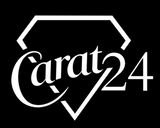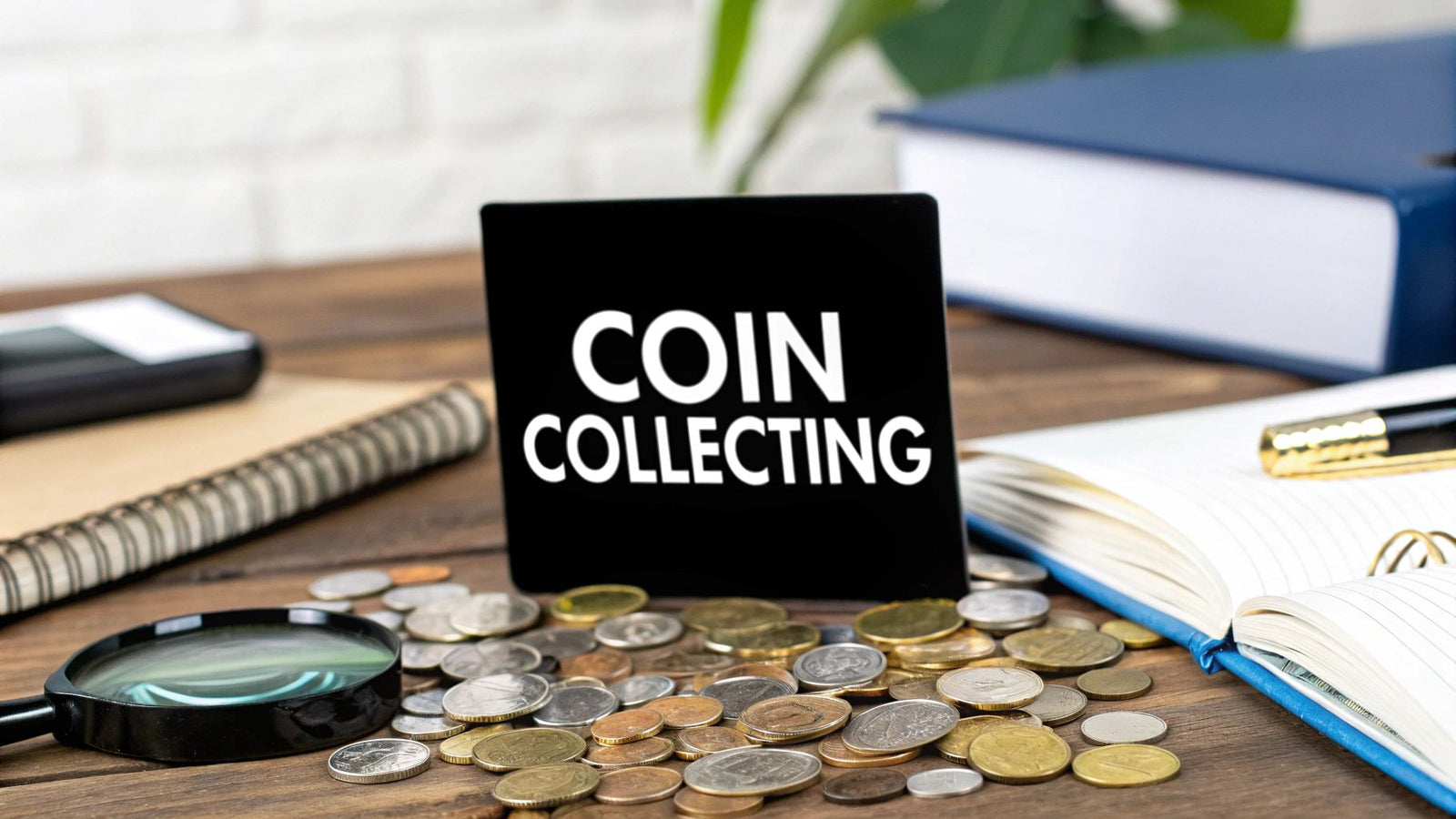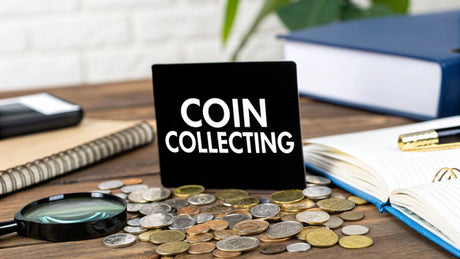Dipping your toes into the world of coin collecting is like opening a history book where every page is a small, metal artifact. Each coin has a story, a small glimpse into the society that minted it, the economy it powered, and the historical figures it celebrated. The appeal is universal, pulling in people who love history, art, and the simple thrill of the hunt.
Your Journey into Coin Collecting Begins Here
Welcome to the fascinating world of numismatics! This isn't just about hoarding old currency; it's about forging a tangible connection with the past. One day you might find yourself captivated by the bold designs of an ancient Roman denarius, and the next you're poring over the intricate details on a modern commemorative dollar.
The path you take is entirely your own, tailored to whatever sparks your curiosity. You can learn more about specific coin types and their backgrounds by exploring our detailed guides on coins and bullion.
Finding Your Path in Numismatics
One of the most exciting first steps is deciding what to collect. There's no right or wrong answer here, which is a huge part of the fun. The best collections are built around a theme or type that genuinely grabs your interest.
Not sure where to start? Here are a few popular avenues:
- Collecting by Country: Zero in on coins from a single nation. The U.S. State Quarters program is a classic entry point, as are Canadian Maple Leafs.
- Collecting by Time Period: Focus your efforts on a specific era that fascinates you, like coins from the American West in the 19th century or currency used during World War II.
- Collecting by Metal Type: Build a collection based on precious metal content, such as classic 90% silver dimes or modern American Gold Eagles.
Coin collecting is more than a niche hobby—it's part of a thriving global market valued at approximately US$ 20.9 billion. Projections show it could more than double to around US$ 47.5 billion by 2035, a testament to the growing interest in both historical significance and precious metals.
It's More Than Just a Hobby
Coin collecting is an engaging pursuit that truly grows with you. It sharpens your eye for detail, deepens your understanding of world history, and plugs you into a passionate global community.
And yes, as you build your collection, you may also be building a tangible asset. Some collectors stumble upon pieces that are not only historically significant but also quite valuable. When you get to that stage, you can explore Gold and Jewelry Buying services, especially if you want the highest payout in Boise. Many local experts offer services like free Xray Scanning and Gold Testing, provide hassle-free offers, and even offer Price Matching. Often, you can save the hassle and sell locally for more than online shipments.
Gathering Your Essential Collector Tools
Diving headfirst into coin collecting without the right gear is a bit like trying to read a book in the dark. A few smart investments right at the start will not only protect your future finds but also unlock a deeper appreciation for the story each coin has to tell.
Think of these tools as the foundation of your new hobby.
The single most important—and simplest—tool is a pair of soft, white cotton gloves. The natural oils on your fingertips might seem harmless, but over time they can cause irreversible damage to a coin's delicate surface. Handling coins with gloves is non-negotiable for preserving their luster and condition, a key factor in their long-term value.
Magnification and Storage Solutions
Next, you need a way to see the tiny details that make a coin truly special. A quality jeweler's loupe or a good magnifying glass is a must-have. For someone just starting out, a magnification level between 5x and 10x is perfect. This is strong enough to let you inspect mint marks, hunt for errors, and admire the incredible craftsmanship of the design.
Of course, once you have your coins, you need to keep them safe. Proper storage is all about protecting your growing collection from environmental damage like moisture and scratches.
Here are a few excellent options to get you started:
- 2x2 Cardboard Flips: These are affordable, easy to find, and feature a small Mylar window for viewing. You can write key details on the cardboard holder, making them fantastic for organizing your first acquisitions.
- Archival-Quality Albums: When you want a more permanent and visually appealing display, albums with dedicated slots for specific series (like Lincoln Cents or State Quarters) are a great choice.
- Inert Plastic Tubes: If you plan to collect rolls of uncirculated coins, these tubes provide secure, airtight protection from the elements.
Proper handling and storage aren't just about keeping coins shiny; they are fundamental practices that directly protect a coin's numismatic grade and financial worth. Neglecting these basics is one of the most common mistakes new collectors make.
Before you buy your first coin, you need the right tools to handle, inspect, and store it. Here's a quick rundown of the gear every new collector should have on hand.
Your First Coin Collecting Toolkit
| Tool | Primary Purpose | Why It's Essential | Estimated Cost |
|---|---|---|---|
| Cotton Gloves | Handling coins safely | Prevents oils from your skin from damaging the coin's surface. | $5 - $10 |
| Jeweler's Loupe | Magnification | Allows you to see fine details, mint marks, and potential errors. | $10 - $25 |
| 2x2 Cardboard Flips | Individual Coin Storage | An affordable way to protect and label individual coins. | $10 - $15 (for a box of 100) |
| Storage Album/Box | Organization & Display | Keeps your collection organized and protected from environmental factors. | $15 - $30 |
This small investment in tools will pay for itself many times over by protecting the value and condition of your collection from day one.
As this infographic shows, setting a budget is a crucial first step, and having the right tools helps you stick to it by making smart, protected purchases.
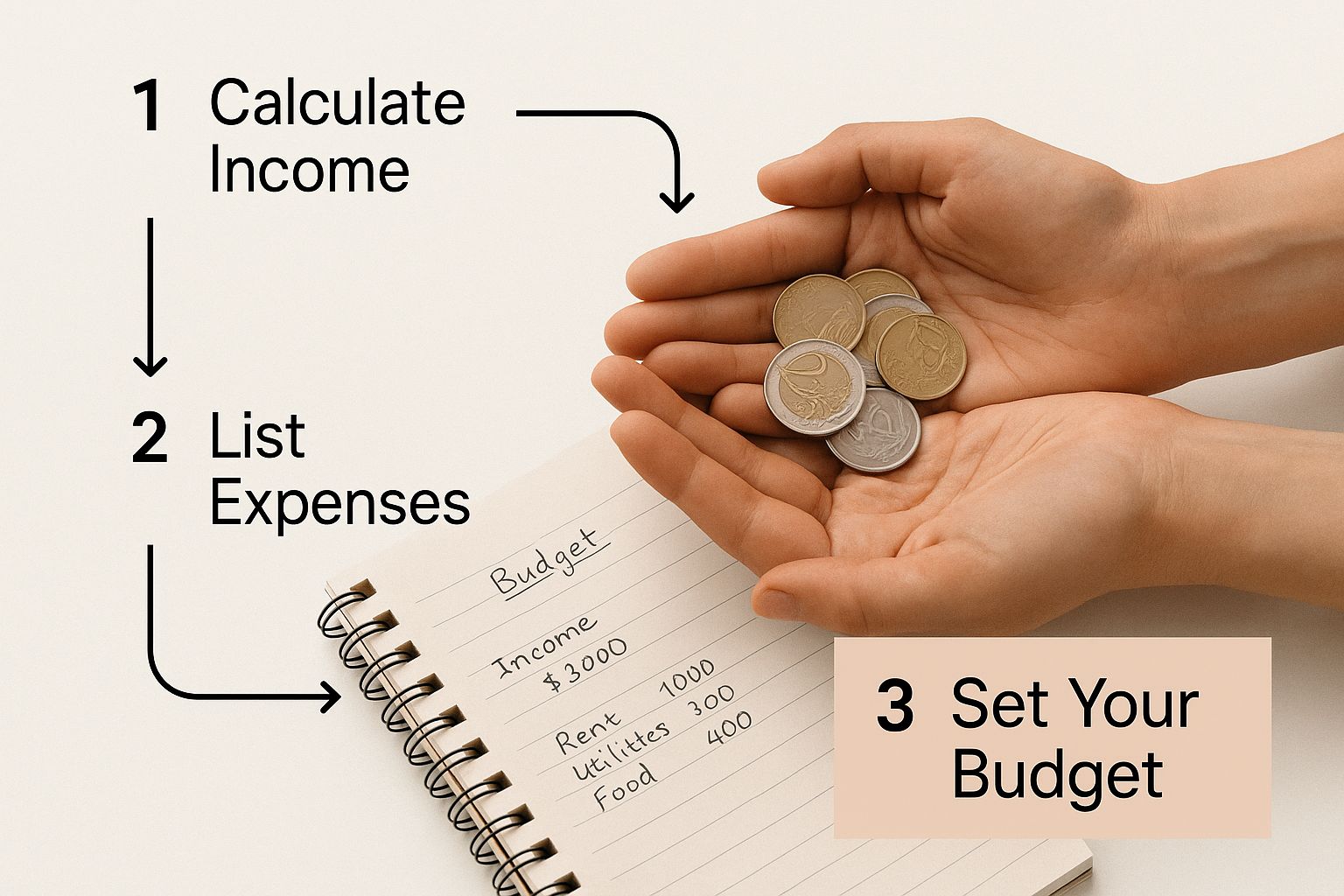
The visual drives home the point that thoughtful planning—from your budget to your tools—is central to building a successful collection.
Eventually, you might acquire pieces that need a professional eye. When you start exploring Gold and Jewelry Buying, especially if you're looking for the highest payout in Boise, seek out experts who provide free Xray Scanning and Gold Testing. These services create transparency and ensure you get a hassle-free offer. Many local dealers also offer Price Matching, so you can save the hassle and sell locally for more than online shipments.
For older pieces like silver dollars, careful maintenance is key. You can learn more by reading our guide on how to clean silver dollars without damaging them. By investing in these fundamental tools from the get-go, you set yourself up for a rewarding and successful journey into the world of coin collecting.
Alright, you've got your tools, and the real fun is about to begin: finding your first coins. The best part? You don’t need a secret map or a massive budget. Some of the most interesting finds are hiding in plain sight, maybe even in the change jingling in your pocket right now.
Plenty of lifelong collectors got their start by simply sifting through their own pocket change or the coins they got back at the grocery store. This classic method, known as "coin roll hunting," is a fantastic, low-cost way to get your hands dirty. Just head to your local bank, swap some cash for rolls of pennies, dimes, or quarters, and see what you find. You'd be surprised what can turn up—older coins with high silver content, interesting mint marks, or even the rare error coin that managed to escape the mint.
Where to Look Beyond Your Pocket Change
While hunting through change is a great way to kick things off, you'll eventually want to be more intentional about growing your collection. This is when you start exploring more dedicated sources, each offering a unique experience and different kinds of treasures.
Here are the go-to spots for most collectors:
- Local Coin Shops: A good coin shop is a beginner’s absolute best friend. The owner is usually a walking encyclopedia of knowledge and can answer your questions, point you toward pieces that fit your interests, and help you stay within your budget.
- Coin Shows and Conventions: Imagine dozens of dealers all under one roof—that’s a coin show. They are incredible places to see a massive variety of numismatic material, handle different types of coins, and chat with seasoned collectors.
- Reputable Online Dealers: The internet has blown the doors wide open for collectors. Websites from established dealers give you access to a global inventory. The key here is to stick with well-known sellers who have solid return policies and a good reputation.
The global coin collecting market is on a serious growth trajectory, projected to climb from USD 19.5 billion to USD 33.2 billion by 2035. A huge driver of this is the rise of online platforms, making it easier than ever for new folks to find coins and connect with the numismatic community. You can dig deeper into these trends over at Market Research Future.
Making Smart First Purchases
Those first few coins you buy are major milestones. They don’t just start your collection; they build your confidence and help you figure out what you truly enjoy. A classic rookie mistake is grabbing a coin just because it looks old. Instead, a much better approach is to buy the highest quality coin you can comfortably afford within your chosen theme.
For instance, if you’re drawn to the history of pre-1965 U.S. silver coins, a great starting point would be a common-date Mercury dime or Washington quarter in a really nice grade. These pieces are affordable, packed with history, and are perfect for learning the ropes of coin grading. To learn more, check out our guide on discovering treasure and identifying valuable coins from 1964 and earlier.
Down the road, you might decide to sell or upgrade some of your pieces. That's a totally normal part of the journey. When that day comes, think about working with a local specialist in Gold and Jewelry Buying. Finding an expert who provides the highest payout in Boise can make a huge difference in your return. Look for a buyer who offers transparent services like free Xray Scanning and Gold Testing to confirm the value and authenticity of your items. A trustworthy professional will give you hassle-free offers and might even provide Price Matching to ensure you're getting the best possible deal. You can save the hassle and sell locally for more than online shipments, guaranteeing a secure and profitable experience.
What Makes a Coin Valuable Anyway?
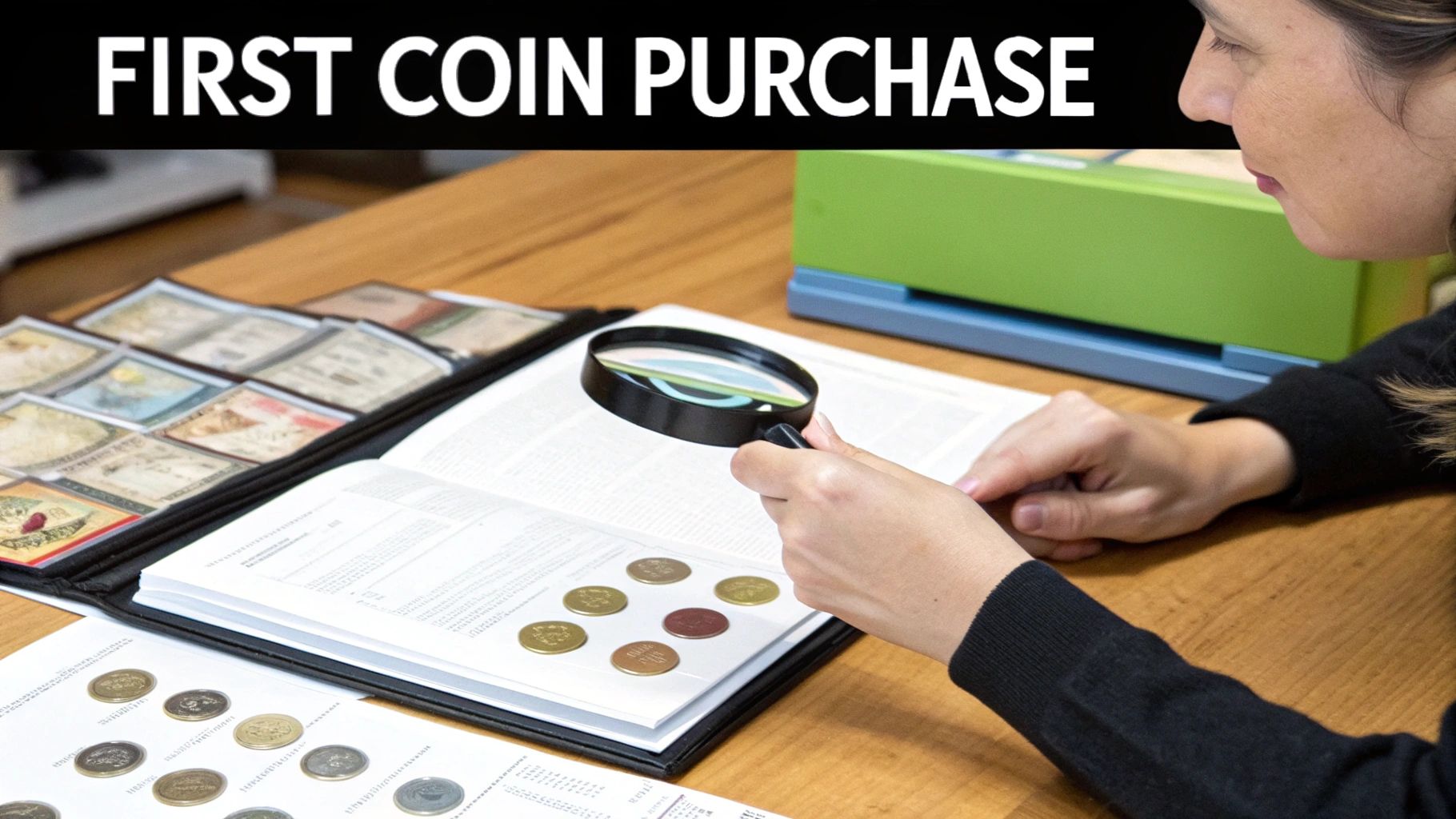
Ever wondered why a dusty old 1943 penny could be worth thousands, while a bigger, shinier coin from the same time is worth just a few cents? It all comes down to a few key factors every new collector needs to get familiar with. Once you understand these core ideas, you’ll start moving from just piling up coins to building a truly thoughtful, valuable collection.
The three pillars of any coin's value are its condition, its rarity, and the demand for it. These elements all work together. A coin can be incredibly rare, but if nobody is looking for it, the value stays flat. On the other hand, a fairly common coin in absolutely perfect, pristine condition can sometimes fetch a surprising price.
Deciphering Coin Condition and Grades
Of all the value factors, condition—or "grade"—is the one you’ll interact with the most. Simply put, it’s a measure of how much wear a coin has seen since the day it was struck at the mint. The scale goes from heavily worn, barely identifiable coins all the way up to flawless, uncirculated examples.
You'll quickly get used to hearing these terms:
- Circulated Grades: These are the coins that have actually been used as money. You'll see descriptions like 'Good' (which ironically means it's heavily worn but still identifiable), 'Fine' (showing clear, moderate wear), and 'Extremely Fine' (only light wear on the highest points of the design).
- Uncirculated (Mint State) Grades: Often shortened to MS, these coins never saw a day of public use and still have their original shine, or "mint luster." This scale is numbered from MS-60 to a theoretically perfect MS-70.
- Proof Grades: These are special-issue coins struck specifically for collectors, not for spending. They have a unique, highly polished, mirror-like finish and are graded on a parallel scale from PR-60 to PR-70.
When you're dealing with potentially valuable coins, professional grading is the gold standard. Services like the Professional Coin Grading Service (PCGS) and the Numismatic Guaranty Corporation (NGC) authenticate a coin and assign it an official grade. This certification is crucial for locking in the value of any significant piece in your collection.
Rarity and Demand: The Market Movers
Rarity is pretty straightforward: how many were made, and how many are still around today? This is determined by the coin’s original mintage—the total number produced by the mint—and its survival rate. A lot of old coins, especially those made from precious metals, were melted down over the decades, making the ones that survived even scarcer. Our guide on the value of old silver dollar coins explores this in more detail.
Demand is the final piece of the puzzle. It’s all about how many collectors are actively trying to find a specific coin. A coin’s connection to a major historical event, a particularly beautiful design, or its place in a popular collecting series can all drive demand through the roof.
The global coin collecting market was valued at $18.10 billion and is projected to hit $43.90 billion by 2034. That shows a powerful and growing interest in both rare coins and precious metals.
When you start adding gold or silver coins to your collection, it’s important to understand the difference between their bullion value (the value of the metal itself) and their numismatic value (their value as a collectible). If you ever decide to sell, a trusted specialist in Gold and Jewelry Buying can help you navigate this. For those of us in Idaho, getting the highest payout in Boise means finding an expert who operates with transparency. Look for professionals who offer free X-ray Scanning and Gold Testing to confirm composition and provide clear, hassle-free offers. With services like Price Matching, you can save the hassle and sell locally for more than online shipments, making sure you get the true worth of your valuables.
Turning Your Collection into a Tangible Asset
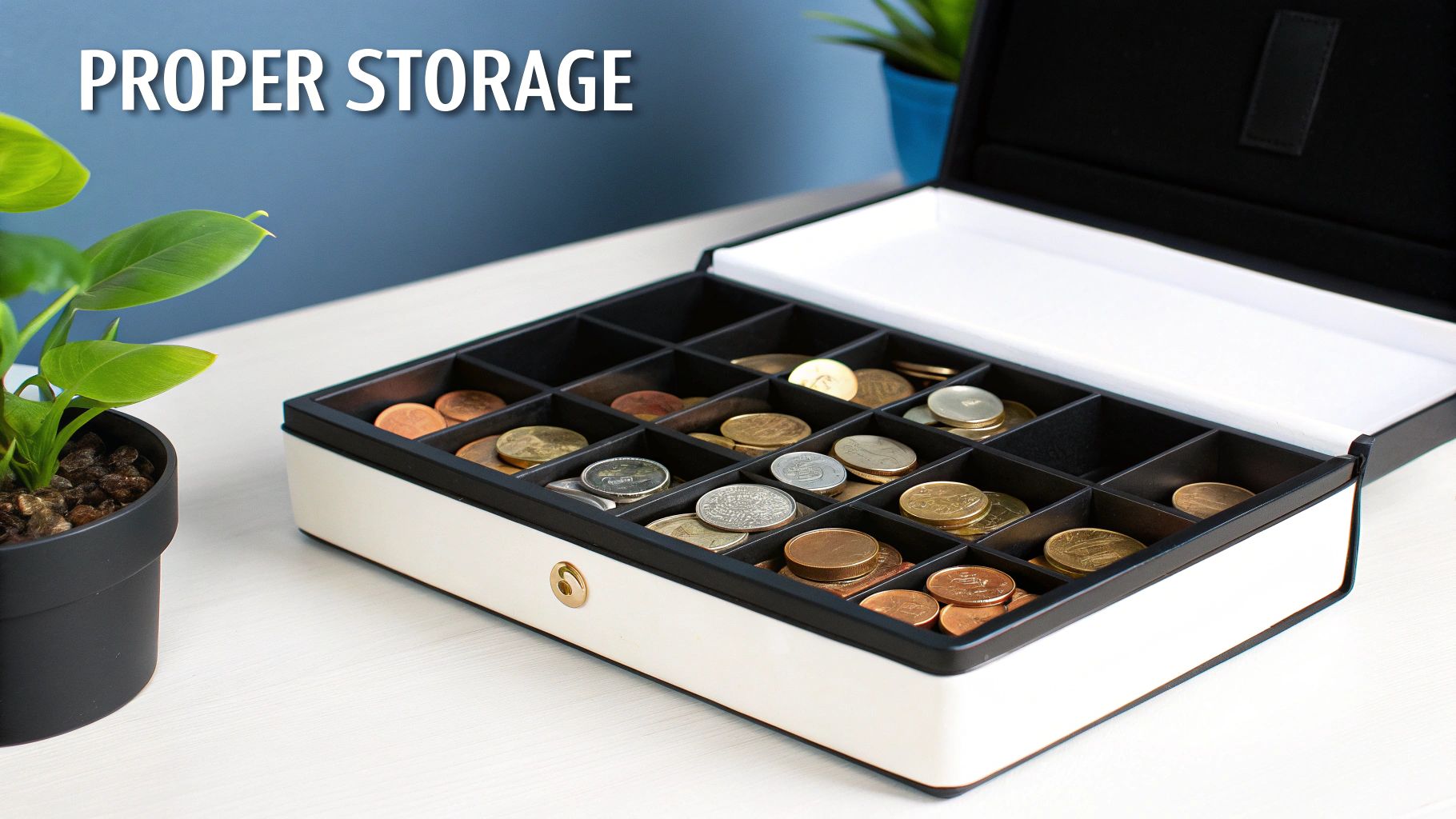
While the sheer joy of the hunt is the heart of any hobby, it's smart to remember that your coin collection is also a tangible asset. As your knowledge grows, the potential value of your holdings will, too. Understanding this financial side adds another rewarding layer to your numismatic journey.
A critical first step is learning the difference between a coin's two primary values. A coin's numismatic value is driven by its rarity, condition, and collector demand. In contrast, its bullion value is tied directly to the spot price of the precious metal it contains, like gold or silver. An 1881-S Morgan Dollar in pristine condition, for example, is worth far more than its silver content simply because of its numismatic appeal.
Realizing the Value in Your Collection
Eventually, you might decide to refine your focus, upgrade a specific piece, or sell duplicates to fund a new acquisition. This is a natural—and exciting—part of the collecting lifecycle. When that time comes, knowing how to navigate the selling process is key to getting the best return. While online platforms are an option, they often come with high fees, shipping risks, and a lot of uncertainty about the final price.
This is where local expertise becomes invaluable. Working directly with a trusted specialist in Gold and Jewelry Buying ensures a secure, transparent transaction. For those in Idaho, seeking out the highest payout in Boise means you're maximizing your return without the headaches of mail-in services.
Local experts can provide on-the-spot evaluations, eliminating the weeks of waiting and uncertainty that come with shipping your valuables to an unknown online buyer. The ability to speak face-to-face with a professional builds trust and ensures you fully understand the offer.
The Benefits of a Local Expert
Choosing to work with a local buyer provides several distinct advantages that online alternatives just can't match. The process should feel clear, fair, and straightforward, putting you in control.
Here’s what you should look for in a trusted local dealer:
- Transparent Testing: Reputable buyers offer services like free Xray Scanning and Gold Testing. This technology confirms the exact metallic composition of your items right in front of you, so there are no guessing games.
- Direct Communication: You should receive hassle-free offers with no hidden fees or commissions. The price you are quoted is the price you receive. Simple as that.
- Competitive Pricing: The best local buyers will often offer Price Matching against verified written offers, guaranteeing you receive top dollar for your coins or jewelry.
Ultimately, you can save the hassle and sell locally for more than online shipments. For a detailed walkthrough of this process, our guide on how to sell collectible coins offers expert tips for a successful sale. By treating your collection with financial respect, you ensure this wonderful hobby remains rewarding in every sense.
A Few Common Questions from New Coin Collectors
Diving into a hobby like coin collecting is exciting, but it’s natural to have a bunch of questions right out of the gate. Getting some solid answers from the start can give you the confidence you need and help you sidestep some of the usual rookie mistakes. Let’s tackle some of the things new collectors ask us most often.
One of the first questions we hear is, "How much money do I need to get started?" Honestly, you can start with whatever you're comfortable spending. You can build an incredible collection just by sifting through your pocket change, which costs you nothing more than the face value of the coins. There's absolutely no minimum investment required to enjoy this hobby.
On the flip side, people often ask, "What coin should I buy as an investment?" While it's true some coins go up in value quite a bit, the best approach for a beginner is to simply collect what you find interesting. Get your feet wet by learning the history and just enjoying the process. The kind of knowledge needed for smart investing will come with time and experience.
Should I Clean My Coins?
This is a big one, and the answer is almost always a hard no. Cleaning a coin, especially with anything abrasive or with harsh chemicals, can completely ruin it. It strips away the natural patina—the toning that develops over time—and leaves behind tiny scratches. This kind of damage is permanent and can absolutely tank a coin's value.
Professional conservation is a whole different ballgame, and it's something best left to the experts for very specific situations. For your own collection, the rule of thumb is to preserve coins just as you find them. The best way to keep them in great shape is to handle them with cotton gloves and store them in proper, inert holders.
How Can I Tell if a Coin Is Real?
Worrying about authenticity is completely normal, especially as you start to look at more valuable pieces. The single best way to protect yourself is to buy from people you can trust. Stick with established local coin shops, major auction houses, and online dealers with long, positive track records.
As your collection grows, you'll eventually come across a coin that makes you wonder. That's when professional services are your best friend.
One of the big advantages of working with a local expert is having access to their tools. For example, things like free X-ray scanning and gold testing can instantly confirm what a coin is made of. This helps spot fakes without doing any harm to the actual coin.
What Should I Do If I Inherit a Collection?
Getting a collection passed down to you can feel like a huge responsibility. The most important first step is to just slow down. Don't clean anything, and don't rush to sell. Take a little time to get organized and see what you actually have. A simple spreadsheet listing the year, mint mark, denomination, and a quick note for each coin is a perfect way to start.
With your inventory in hand, you can start to get a ballpark idea of value. Online price guides and recent auction sales can give you a rough estimate. For a more precise appraisal, especially if there are gold or silver coins involved, talking to a professional is the next logical step.
If you ultimately decide to sell some or all of the coins, finding a specialist in Gold and Jewelry Buying is key. You want to find a dealer who offers the highest payout in Boise to make sure you’re getting a fair price based on the current market. Look for businesses that give hassle-free offers and even have a Price Matching policy—that shows they're transparent and competitive. Often, you can save the hassle and sell locally for more than online shipments, giving you a secure and profitable way to handle your inherited assets.
Ready to explore the value of your coins or jewelry? At Carat 24 - Trusted Gold Experts, we offer free, no-obligation evaluations with transparent testing to help you understand what you have. Visit us today to get the highest payout in Boise.
